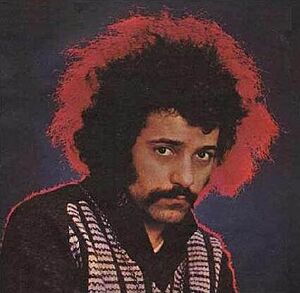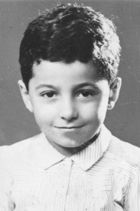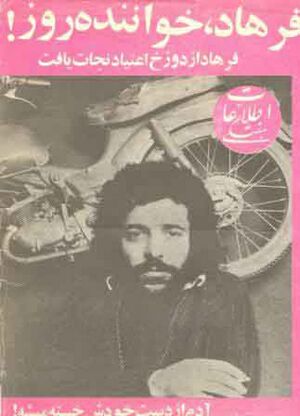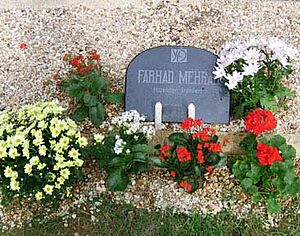Farhad (singer) facts for kids
Quick facts for kids
Farhad
|
|
|---|---|

Farhad in the 1970s
|
|
| Background information | |
| Native name |
فرهاد مهراد
|
| Birth name | Farhad Mehrad |
| Born | 20 January 1944 Tehran, Iran |
| Origin | Tehran |
| Died | 31 August 2002 (aged 58) Paris, France |
| Genres |
|
| Occupation(s) |
|
| Instruments | singing, guitar, piano |
| Years active | 1964–1979, 1989–2002 |
Farhad Mehrad (born January 20, 1944 – died August 31, 2002) was a very famous Iranian singer, songwriter, guitarist, and pianist. He was a talented musician who made the first English rock and roll album in Iran. Farhad became well-known among Iranian rock, pop, and folk musicians before the Islamic Revolution in 1979.
After the revolution, he faced challenges and was not allowed to sing for several years. Farhad's first concert after this time was in 1990. Many people still see him as one of the most important and respected Iranian singers of his time. Farhad was also a founding member of the popular Iranian band called Black Cats. His song "Jomeh" (meaning "Friday") for the movie "Khodahafez Rafigh" in 1971 made him very popular.
Contents
Farhad's Early Life
Farhad was born in Tehran, Iran, on January 20, 1944. His father, Reza Mehrad, was an Iranian diplomat. He worked for the Iranian Ministry of Foreign Affairs in different countries.
When Farhad was three years old, he loved listening to his brother's violin lessons. His family bought him a cello, and he started taking lessons. But after only three lessons, his cello broke. Farhad said, "The instrument broke into pieces, and so did my soul." That was the end of his cello playing.
At school, Farhad discovered a strong love for literature. He wanted to study literature in high school. However, his uncle made him study science instead, even though he was not good at it. He was only good at literature and English. Because his interests were ignored, he left high school in the 11th grade.
Farhad's Music Career
Starting with a Band
After leaving high school, Farhad met an Armenian music group called The Four Elfs. He learned to play music by practicing with their instruments. Soon, he became the guitar player for the band. The band traveled to southern Iran to perform for a large company club.
Before their first show, the band's main singer was missing. So, they decided Farhad should sing instead. Farhad was very careful about saying words correctly. He also knew a lot about world literature. This helped him sing songs in Italian, French, and English. People were amazed that his first language was Persian. The band became very successful and performed for many nights.
After a while, Farhad left the band to start his own solo career. In 1964, he sang some English songs on an Iranian TV show. This helped him become even more well-known.
Later, he performed at a big event sponsored by Etelat Javanan, a popular youth magazine. He played guitar and sang for a huge crowd at Amjadieh Stadium. This is where Shahbal Shabpareh, the leader of the famous Iranian band Black Cats, heard about Farhad.
Joining the Black Cats
In 1967, Farhad joined the Black Cats band. He became their singer, guitar player, and piano player. Other members included Shahbal Shabpareh (percussion), Shahram Shabpareh (guitar), Hassan Shamaizadeh (saxophone), Homayoun Khajehnouri (guitar), and Manouchehr Eslami (trumpet). The band started playing at the Couchini Club.
Manouchehr Eslami said Farhad was the most important member of the band. He explained that Farhad didn't need to read music sheets. He learned songs by listening and playing by ear. Farhad could easily match his voice and instrument with the other band members. He only came to practice sessions out of respect for the others.
During the band's busiest and most successful time, Farhad sang his first Persian song. It was called Age Ye Jo Shaans Daashti ("With a Little Bit of Luck"). This song was used in the Persian version of the movie Banooye Zibaye Man (My Fair Lady).
Later, Farhad left the Black Cats to take care of his sick sister in England. While there, he met a famous music producer. He was offered a record deal, but due to his illness and personal issues, the deal never happened. His trip, which was supposed to be two months, lasted a whole year.
Becoming a Solo Star (1969–1974)
In 1969, Farhad sang "Marde Tanha" ("A Lonely Man") for the movie Reza Motori (Reza, the Biker). Esfandyar Monfaredzadeh wrote the music, and Shahyar Ghanbari wrote the words. After the movie came out, the song was released on a gramophone record. Farhad quickly became a very famous singer.
Farhad only sang songs that had a special message he believed in. Because of this, after "Marde Tanha," he only released three more songs between 1971 and 1973. These songs were "Jomeh" ("Friday"), "Hafteye Khakestari" ("The Grey Week"), and "Ayeneha" ("Mirrors").
During the Revolution
Before the 1979 Iranian Revolution, during a time of political change in Iran, Farhad recorded six songs. These songs had messages about unity and freedom. They became very important to many Iranians.
On February 11, 1979, the day after the Iranian revolution, his song "Vahdat" ("Unity") was played on Iranian television. It was played to celebrate the revolution and freedom.
After the Revolution
After the revolution, the new government did not support Farhad. They often refused to let him release his music. Even "Vahdat," the song that celebrated the revolution, was not allowed to be released. The government was worried about how popular Farhad was and his influence on people. They wanted him to be forgotten.
However, someone with good connections in the government got permission to release Farhad's old songs. These were songs he recorded before the revolution. They were released as an album called Vahdat (Unity), but without Farhad's permission. Many Iranians bought the album to remember Farhad and his amazing songs.
His Comeback
In 1993, after 15 years of not releasing new music, Farhad finally got permission to release his first album. It was called Khab Dar Bidari ("Sleep while Awake"). This album quickly became very popular as soon as it was released.
After this album, Farhad felt it was too difficult to get permission from the Iranian government. So, he released his next album, Barf ("Snow"), in the United States in 1999. Barf was released in Iran a year later.
His Last Album
After Barf, Farhad decided to record an album with songs from different countries and in different languages. He planned to call the album Amin (Amen). He started recording, but sadly, he passed away before he could finish the album.
Farhad's Passing
In September 2000, Farhad's health became very serious after two years of treatment. On August 31, 2002, he passed away in Paris from a serious liver illness called hepatitis C.
Many famous Iranian singers and entertainers attended his funeral. Shahyar Ghanbari, a lyricist, said that a part of him died with Farhad. Farid Zoland said he was very sad about Farhad's death. Ebi said he lost his best friend and favorite singer.
Farhad is buried in the Cimetière de Thiais cemetery, just outside Paris. After his death, a museum was created in Tehran, Iran, to display his personal items. Also, two documentaries, Farhad's Fridays and Snow, have been made about his life.
Farhad's Music Albums
Studio Albums
- Khab Dar Bidari (1993)
- Barf (2000)
- Amin (Unfinished)
| The name of Persian Songs | Year | The name of Songs in English |
|---|---|---|
| * Age Ye Jo Shans Dashtim | 1965 | With a little Bit of Luck |
| * Jomeh | 1970 | Friday |
| * Khasteh | 1972 | Tired |
| * Asir-e Shab | 1973 | Captive of the Night |
| * Shabaneh 1 | 1973 | Nightly 1 |
| * Ayeneha | 1971 | Mirrors |
| * Hafteh Khakestari | 1974 | Gray Week |
| * Koodakaneh | 1976 | Childish |
| * Saghf | 1977 | Roof |
| * Avar | 1977 | Ruin |
| * Shabaneh 2 | 1978 | Nightly 2 |
| * Jomeh baraye Jomeh | 1978 | Friday for Friday |
| * Vahdat | 1979 | Unity |
| * Khiale khoshi | 1993 | At Leisure |
| * Katibeh | 1997 | Inscription |
| *Banooye gisoo hanaei | 1997 | Lady With Hana Locks |
Songs in English
Farhad sang many English songs and songs in other languages. Only these were officially recorded:
- Take Five
- Yesterday
- I Put a Spell on You
- Come Down Jesus
- Sad Lisa
- Romance of Love
- Sunrise/Sunset
- When the Sun Comes Down
- Unchain My Heart
- Yesterday When I Was Young
- Don't Cry for Me Argentina
- Let It Be
- Master Song
- Alone Again (Naturally)
- You've Got a Friend
- Unchained Melody
- California Dreamin'
- Like a Sad Song
- Suzanne
- Windmills of Your Mind
- Everybody's Talking at Me
- Together Again
- Don't Let Me Be Misunderstood
- Sympathy
- Love's Been Good to Me
- Solitary Man
- Moment to Moment
- Hey, That's No Way to Say Goodbye
- Handyman
- You Won't Love Me
- If You Go Away
- I Call You
- I'll Be There
- Hurt
- Walking Alone
- Eleanor Rigby
- Japan Allspice (mixed in English and Persian)
- Good Fantasist (mixed in English and Persian)
Songs in Other Languages
- Qui? (French song)
- Romanian song (A difficult song with whistle)
- Temnaya noch (Russian song)
- An die Freude (German song)
- Nadie me quiere (Spanish song)
- Si je vivrai (French song)
- No pal (Armenian song)
Farhad's Film Work
Farhad contributed as a singer to the music of these films:
- Keep the Flight in Mind (2012, Documentary)
- Mahiha Dar khak Mimirand (1977)
- Goodbye Friend (1971)
- Reza Motorcyclist (1970)
See also
- Iranian rock
- List of Iranian musicians




